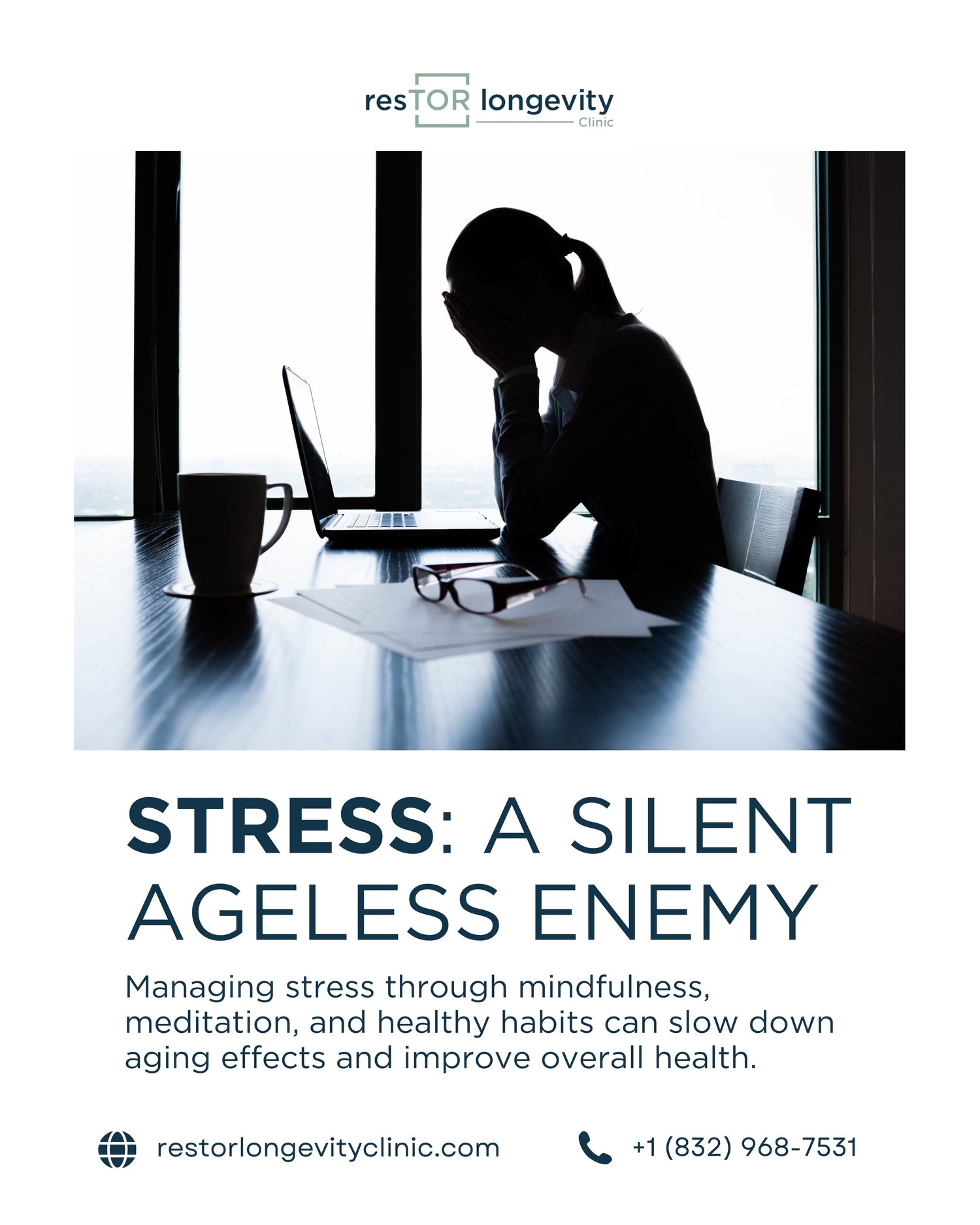Did you know that chronic stress can age you faster than any skincare product can reverse? Research shows that stress contributes significantly to many health issues, while also accelerating the aging process by increasing inflammation, harming your immune system, and causing cellular damage. This blog post explores the profound impact stress has on our bodies and provides effective strategies to manage it. By mastering stress management techniques such as mindfulness, meditation, and adopting healthier habits, you can not only slow down these aging effects but also improve your overall well-being. Stay tuned as we delve deep into understanding how you can prioritize your mental health for a longer, healthier life!
Understanding Stress and Its Impact on Aging
Stress is often described as a silent killer. It affects us without us even realizing the magnitude of its harm. In a fast-paced world filled with deadlines, expectations, and various life pressures, chronic stress has become a common part of life. Understanding the biological and psychological implications of stress is crucial to grasp how it accelerates aging.
The Biological Mechanism of Stress
When you experience stress, your body goes into fight or flight mode. This response triggers the release of hormones like cortisol and adrenaline, preparing you to react to danger. Excessive and prolonged exposure to these stress hormones can have damaging effects on the body:
1. Inflammation: Research shows that stress increases the body's inflammatory responses. Chronic inflammation is linked to several health issues, including heart disease, diabetes, and even some types of cancer.
2. Immune System Suppression: Continuous stress can weaken your immune system, making you more susceptible to infections and diseases. This weakening can hinder your body's ability to heal and recover.
3. Cellular Aging: Telomeres, the protective caps on the end of chromosomes, shorten with each cell division. Stress is associated with accelerated telomere shortening, meaning your cells age quicker under chronic stress.
4. Mental Health Decline: Chronic stress can lead to mental health disorders such as anxiety and depression, which further exacerbate physical health issues.
Understanding these stressors helps illustrate why managing stress should be a priority for anyone looking to maintain their health and well-being as they age.
The Mental Implications of Stress
Our mental and emotional responses to stress can also contribute to physical aging. Stress can severely impact our lifestyle choices. People under stress are more likely to engage in unhealthy behaviors, which directly affect their quality of life and longevity.
1. Poor Nutrition: Stress often leads to unhealthy eating habits, like excessive snacking on junk food or skipping meals entirely. Both can lead to weight gain and nutrient deficiencies.
2. Neglecting Exercise: When you are stressed, adding exercise to your routine might seem overwhelming, leading to a sedentary lifestyle. Regular physical activity is vital for managing weight and reducing stress levels.
3. Impacts on Sleep: Stress often interferes with sleep patterns, leading to insomnia or interrupted sleep. Lack of sleep can significantly result in fatigue, affecting cognitive function and overall health.
4. Avoiding Medical Care: Many people avoid seeking medical care when stressed, which can lead to undiagnosed and untreated health issues.
Recognizing the mental implications of stress is the first step in reclaiming control over your life, your health, and your aging process.
Effective Strategies to Manage Stress
Given that stress is an inevitable part of life, learning how to manage it effectively is essential. Here are several actionable strategies that can help mitigate stress and its effects:
1. Mindfulness Meditation
Practicing mindfulness involves being fully present in the moment without judgment. Mindfulness meditation can help reduce stress by enhancing your awareness and calming your mind. Regular meditation can lower cortisol levels, improve focus, and promote emotional well-being. Start with just five minutes each day, gradually increasing your mindfulness practice as you feel comfortable.
2. Regular Exercise
Exercise is a powerful stress reliever. Physical activity can boost your mood, improve sleep, and increase your energy levels. Whether it’s yoga, running, or lifting weights, find a form of exercise that you enjoy and make it a regular part of your routine. Aim for at least 30 minutes of moderate exercise most days of the week.
3. Healthy Nutrition
Eating a well-balanced diet rich in fruits, vegetables, whole grains, and lean proteins can help improve your mood and reduce stress levels. Nutrient-rich foods provide the essential vitamins and minerals your body needs to focus on managing stress effectively. Also, remember to stay hydrated, as dehydration can exacerbate feelings of stress.
4. Quality Sleep
Prioritizing sleep is crucial for managing stress. Aim for seven to nine hours of quality sleep each night. Establish a bedtime routine that includes limiting screen time before bed and creating a relaxing environment to help signal to your body that it’s time to sleep.
5. Social Connections
Maintaining strong, supportive relationships with friends and family can help buffer against stress. Social support plays a vital role in reducing feelings of isolation and providing comfort. Make an effort to connect regularly with those who uplift and inspire you.
6. Professional Help
Sometimes, stress can feel overwhelming or unmanageable. Seeking help from a mental health professional can provide valuable support. Therapists can help you identify stress triggers and provide coping strategies tailored to your needs.
The Importance of Prioritizing Mental Well-being
Prioritizing mental well-being is essential for slowing the aging process and improving overall health. When we care for our mental health, we are better equipped to deal with stress and its detrimental effects on our bodies.
By implementing effective stress management strategies into your daily routine, you can significantly impact not only how you feel but also how your body ages.
Where Do We Go from Here?
As we've discovered, chronic stress constitutes a silent, aging adversary that most people unknowingly face. The effects on your body and mind can be profound, leading to a quicker decline in health and vitality. However, the journey to combating stress and enhancing your well-being begins with small but impactful changes. Start incorporating techniques such as mindfulness, regular exercise, and a healthy lifestyle into your routine today.
Remember, the path to a longer, healthier life does not need to be overwhelming. Make those small changes consistently and watch them accumulate into significant results over time.
If you are ready to transform your approach to stress management and prioritize your health, schedule a consultation with us today [Your Link Here]!
At the end of the day, caring for your mental health is not just about reducing stress; it’s about setting yourself up for a life filled with vitality, health, and joy. Each small step you take towards managing stress is a step towards extending your years of health and happiness.
Let’s embrace every moment and prioritize the life we wish to live!



